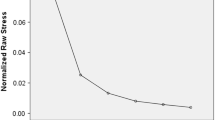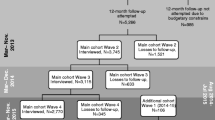Abstract
The multivariate socio-demographic risk factors for problem gambling have been well documented. While this body of research is valuable in determining risk factors aggregated across various populations, the majority of studies tend not to specifically identify particular subgroups of problem gamblers based on the interaction between variables. The identification of problem gambling subgroups offers the potential for improved harm-reduction initiatives in particular geographic contexts. We introduce an analytical approach termed recursive partitioning, commonly used in the health sciences but infrequently employed in gambling research, to identify specific gambler subgroups based on the interaction of a range of predictor variables. Recursive partitioning creates groups of cases (e.g. gamblers) with similar outcomes by repeatedly splitting each group into smaller and more homogenous subgroups. We employ it to define problem gambler subgroups within a diverse population context (i.e. northern Australia) and compare the results with a multivariate analysis of the same dataset using a generalized linear regression model. We assess the advantages and disadvantages of each approach, and argue that recursive partitioning is an easily-interpretable approach that may be useful both in identifying problem gambling subgroups and in developing targeted harm-minimisation strategies.

Similar content being viewed by others
Notes
An 18-year old Indigenous male living in group accommodation 500 m from the Darwin casino (with 769 EGMs) in a low IRSAD neighborhood, with school-level education, low income and low occupational skill who visits the casino alone and drinks eight standard drinks on that visit.
References
Australian Bureau of Statistics. (2007). Census of Population and Housing: Basic Community Profile, 2006 (No. 2001.0). Canberra: Australian Bureau of Statistics. Retrieved from http://www.abs.gov.au/ausstats/abs@.nsf/mf/2001.0 archived at http://www.webcitation.org/67tG48nDc.
Australian Bureau of Statistics. (2008). An Introduction to Socio-Economic Indexes for Areas (SEIFA), 2006 (No. 2039.0). Canberra: Australian Bureau of Statistics. Retrieved from http://www.abs.gov.au/ausstats/abs@.nsf/mf/2039.0/ archived at http://www.webcitation.org/67tGG7kJi.
Australian Bureau of Statistics. (2009). Australian and New Zealand Standard Classification of Occupations, First Edition, Revision 1 (No. 1220.0). Canberra: Australian Bureau of Statistics. Retrieved from http://www.abs.gov.au/ausstats/abs@.nsf/mf/1220.0 archived at http://www.webcitation.org/67tGWy0p4.
Australian Bureau of Statistics. (2011). Australian Social Trends, June 2011 (No. 4102.0). Canberra: Australian Bureau of Statistics. Retrieved from http://www.abs.gov.au/ausstats/subscriber.nsf/LookupAttach/4102.0Publication29.06.111/$File/41020_ASTJun2011.pdf archived at http://www.webcitation.org/68v4xiFRu.
Berk, R. A. (2008). Statistical learning from a regression perspective. New York: Springer Verlag.
Blaszczynski, A., & Nower, L. (2002). A pathways model of problem and pathological gambling. Addiction, 97(5), 487–499. doi:10.1046/j.1360-0443.2002.00015.x.
Bondolfi, G., Osiek, C., & Ferrero, F. (2000). Prevalence estimates of pathological gambling in Switzerland. Acta Psychiatrica Scandinavica, 101(6), 473–475. doi:10.1034/j.1600-0447.2000.101006473.x.
Breiman, L. (2001a). Random forests. Machine Learning, 45(1), 5–32. doi:10.1023/A:1010933404324.
Breiman, L. (2001b). Statistical modeling: the two cultures. Statistical Science, 16(3), 199–231. doi:10.1214/ss/1009213726.
Breiman, L., Friedman, J., Stone, C., & Olshen, R. A. (1984). Classification and regression trees. Belmont: Wadsworth International Group.
Delen, D., & Sirakaya, E. (2006). Determining the efficacy of data-mining methods in predicting gaming ballot outcomes. Journal of Hospitality & Tourism Research, 30(3), 313–332. doi:10.1177/1096348006286795.
Doran, B., & Young, M. (2010). ‘Mobile mindsets’: EGM venue usage, gambling participation, and problem gambling among three itinerant groups on the Sunshine Coast of Australia. International Gambling Studies, 10(3), 269–288. doi:10.1080/14459795.2010.531040.
Feigelman, W., Kleinman, P. H., Lesieur, H. R., Millman, R. B., & Lesser, M. L. (1995). Pathological gambling among methadone patients. Drug and Alcohol Dependence, 39(2), 75–81. doi:10.1016/0376-8716(95)01141-K.
Ferris, J., & Wynne, H. (2001). The Canadian Problem Gambling Index: User Manual. Ottawa: Canadian Centre on Substance Abuse. Retrieved from http://www.ccsa.ca/2003%20and%20earlier%20CCSA%20Documents/ccsa-009381-2001.pdf archived at http://www.webcitation.org/67tGlKq7P.
Goldman, L., Cook, E. F., Brand, D. A., Lee, T. H., Rouan, G. W., Weisberg, M. C., Acampora, D., et al. (1988). A computer protocol to predict myocardial infarction in emergency department patients with chest pain. The New England Journal of Medicine, 318(13), 797–803. doi:10.1056/NEJM198803313181301.
Goldman, L., Cook, E. F., Johnson, P. A., Brand, D. A., Rouan, G. W., & Lee, T. H. (1996). Prediction of the need for intensive care in patients who come to the emergency departments with acute chest pain. The New England Journal of Medicine, 334(23), 1498–1504. doi:10.1056/NEJM199606063342303.
Gruenewald, T. L., Mroczek, D. K., Ryff, C. D., & Singer, B. H. (2008). Diverse pathways to positive and negative affect in adulthood and later life: an integrative approach using recursive partitioning. Developmental Psychology, 44(2), 330–343. doi:10.1037/0012-1649.44.2.330.
Hall, G. W., Carriero, N. J., Takushi, R. Y., Montoya, I. D., Preston, K. L., & Gorelick, D. A. (2000). Pathological gambling among cocaine-dependent outpatients. The American Journal of Psychiatry, 157(7), 1127–1133. doi:10.1176/appi.ajp.157.7.1127.
Hawley, C. E., Glenn, M. K., & Diaz, S. (2007). Problem gambling in the workplace, characteristics of employees seeking help. Work: A Journal of Prevention, Assessment and Rehabilitation, 29(4), 331–340.
Hing, N., & Nuske, E. (2011). Assisting problem gamblers in the gaming venue: An assessment of practices and procedures followed by frontline hospitality staff. International Journal of Hospitality Management, 30(2), 459–467. doi:10.1016/j.ijhm.2010.09.013.
Hothorn, T., Hornik, K., & Zeileis, A. (2006). Unbiased recursive partitioning: a conditional inference framework. Journal of Computational and Graphical Statistics, 15, 651–674. doi:10.1198/106186006X133933.
Johansson, A., Grant, J. E., Kim, S. W., Odlaug, B. L., & Götestam, K. G. (2008). Risk factors for problematic gambling: a critical literature review. Journal of Gambling Studies, 25(1), 67–92. doi:10.1007/s10899-008-9088-6.
Kass, G. V. (1980). An exploratory technique for investigating large quantities of categorical data. Journal of the Royal Statistical Society. Series C (Applied Statistics), 29(2), 119–127. doi:10.2307/2986296.
Ladouceur, R., Boudreault, N., Jacques, C., & Vitaro, F. (1999). Pathological gambling and related problems among adolescents. Journal of Child & Adolescent Substance Abuse, 8(4), 55–68. doi:10.1300/J029v08n04_04.
Loh, W. (2011). Classification and regression trees. Wiley Interdisciplinary Reviews: Data Mining and Knowledge Discovery, 1(1), 14–23. doi:10.1002/widm.8.
Markham, F., Young, M., & Doran, B. (2012). The relationship between alcohol consumption, gambling behaviour and problem gambling during a single visit to a gambling venue. Drug and Alcohol Review, Advance online publication.. doi:10.1111/j.1465-3362.2012.00430.x.
McKenzie, D. P., McFarlane, A. C., Creamer, M., Ikin, J. F., Forbes, A. B., Kelsall, H. L., Clarke, D. M., et al. (2006). Hazardous or harmful alcohol use in Royal Australian Navy veterans of the 1991 Gulf War: identification of high risk subgroups. Addictive Behaviors, 31(9), 1683–1694. doi:10.1016/j.addbeh.2005.12.027.
Merkle, E. C., & Shaffer, V. A. (2011). Binary recursive partitioning: background, methods, and application to psychology. British Journal of Mathematical and Statistical Psychology, 64(1), 161–181. doi:10.1348/000711010X503129.
Morgan, R. D., Olson, K. R., Krueger, R. M., Schellenberg, R. P., & Jackson, T. T. (2000). Do the DSM decision trees improve diagnostic ability? Journal of Clinical Psychology, 56(1), 73–88. doi:10.1002/(SICI)1097-4679(200001)56:1<73::AID-JCLP7>3.0.CO;2-I.
Potenza, M. N., Steinberg, M. A., McLaughlin, S. D., Wu, R., Rounsaville, B. J., & O’Malley, S. S. (2001). Gender-related differences in the characteristics of problem gamblers using a gambling helpline. The American Journal of Psychiatry, 158(9), 1500–1505. doi:10.1176/appi.ajp.158.9.1500.
Potenza, M. N., Steinberg, M. A., & Wu, R. (2005). Characteristics of gambling helpline callers with self-reported gambling and alcohol use problems. Journal of Gambling Studies, 21(3), 233–254. doi:10.1007/s10899-005-3098-4.
PSMA Australia. (2010). Product description: G-NAF version 1.11. Canberra: PSMA Australia. Retrieved from http://www.psma.com.au/products/documents/G-NAF%20Prod%20Descr.pdf.
Quinlan, J. R. (1993). C4.5: programs for machine learning. San Mateo: Morgan Kaufmann Publishers.
R Development Core Team. (2011). R: A language and environment for statistical computing. Vienna: R Foundation for Statistical Computing.
Raylu, N., & Oei, T. P. (2004). Role of culture in gambling and problem gambling. Clinical Psychology Review, 23(8), 1087–1114. doi:10.1016/j.cpr.2003.09.005.
Schmitz, N., Kugler, J., & Rollnik, J. (2003). On the relation between neuroticism, self-esteem, and depression: results from the National Comorbidity Survey. Comprehensive Psychiatry, 44(3), 169–176. doi:10.1016/S0010-440X(03)00008-7.
Strobl, C., Malley, J., & Tutz, G. (2009). An introduction to recursive partitioning: rationale, application and characteristics of classification and regression trees, bagging and random forests. Psychological Methods, 14(4), 323–348. doi:10.1037/a0016973.
Venables, W. N., & Ripley, B. D. (2002). Modern applied statistics with S. Statistics and computing (4th ed.). New York: Springer.
Volberg, R. A., Abbott, M. W., Rönnberg, S., & Munck, I. M. E. (2001). Prevalence and risks of pathological gambling in Sweden. Acta Psychiatrica Scandinavica, 104(4), 250–256. doi:10.1111/j.1600-0447.2001.00336.x.
Welte, J. W., Barnes, G. M., Wieczorek, W. F., & Tidwell, M.-C. (2004a). Gambling participation and pathology in the United States - A sociodemographic analysis using classification trees. Addictive Behaviors, 29(5), 983–989. doi:10.1016/j.addbeh.2004.02.047.
Welte, J. W., Barnes, G. M., Wieczorek, W. F., Tidwell, M.-C. O., & Parker, J. C. (2004b). Risk factors for pathological gambling. Addictive Behaviors, 29(2), 323–335. doi:10.1016/j.addbeh.2003.08.007.
Winters, K. C., Stinchfield, R., & Fulkerson, J. (1993). Patterns and characteristics of adolescent gambling. Journal of Gambling Studies, 9(4), 371–386. doi:10.1007/BF01014628.
Young, M., & Stevens, M. (2008). SOGS and CPGI: parallel comparison on a diverse population. Journal of Gambling Studies, 24(3), 337–356. doi:10.1007/s10899-007-9087-z.
Young, M., Stevens, M., & Morris, M. (2008). Problem gambling within the non-Indigenous population of the Northern Territory of Australia: a multivariate analysis of risk factors. International Gambling Studies, 8(1), 77–93. doi:10.1080/14459790701870571.
Zeileis, A., Hothorn, T., & Hornik, K. (2008). Model-based recursive partitioning. Journal of Computational and Graphical Statistics, 17(2), 492–514. doi:10.1198/106186008X319331.
Zhang, H., & Bracken, M. B. (1995). Tree-based risk factor analysis of preterm delivery and small-for-gestational-age birth. American Journal of Epidemiology, 141(1), 70–78.
Zhang, H., & Singer, B. (2010). Recursive partitioning and applications (2nd ed.). New York: Springer.
Acknowledgments
This research was supported in part by grants from the Community Benefit Fund of the Northern Territory Government, the Northern Territory Research and Innovation Fund and Australian Research Council Project LP0990584.
Author information
Authors and Affiliations
Corresponding author
Rights and permissions
About this article
Cite this article
Markham, F., Young, M. & Doran, B. Detection of Problem Gambler Subgroups Using Recursive Partitioning. Int J Ment Health Addiction 11, 281–291 (2013). https://doi.org/10.1007/s11469-012-9408-z
Published:
Issue Date:
DOI: https://doi.org/10.1007/s11469-012-9408-z




